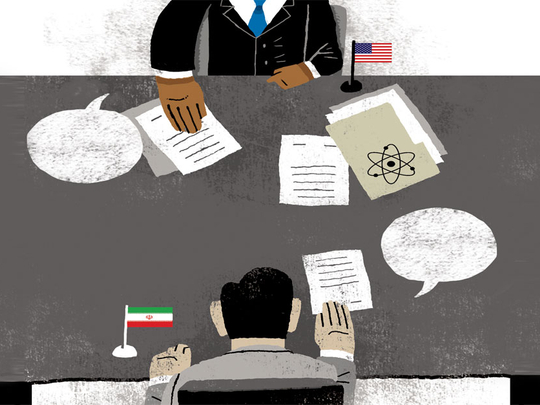
Last-minute talks on a nuclear deal with Iran are due to end soon between Tehran and the major world powers, including the P5+1 (US, Britain, France, Russia, China + Germany). If a deal is reached at the Vienna talks, that began last Thursday and are expected to conclude by tomorrow, an agreement could see the end of international sanctions on Tehran that would eventually open the door to better relations with the rest of the world. If this is to happen, Iran, as a regional super power, will be greatly empowered by the P5+1 and emerge the region’s main partner to the US and its allies. In fact, many realistically believe that such a partnership is almost in place. We have already heard that there was an implicit understanding between the parties to extend the talks over the nuclear issue for another five or six months if no final agreement is reached by tomorrow.
In fact, it is no longer a secret that whether the nuclear talks finally reach at an agreement or not — as well-placed sources intimately closed to Iran-US behind-the-scene discussion recently revealed to various American outlets — that Obama administration has already resumed a fully engaged relation with its Iranian counterpart. Both sides seem to clearly share a number of strategically important joint interests in the region that are vital to long-term policies for both sides. A section of the US media was lately busy analysing a recent letter (apparently one of four) that Obama had secretly exchanged with Iran’s spiritual leader Ali Khamenei, implying Washington’s clear recognition of Iran’s considerable influence in both Iraq and Syria as well as in Lebanon through Hezbollah’s powerful militia.
Whether it is directly aiming at bailing out Bashar Al Assad’s bankrupt regime and encouraging Hezbollah to directly save it from certain collapse last year, or successfully preventing ambitious former Iraqi premier Nouri Al Maliki from standing for a third term and replacing his government with a more nationally represented cabinet, Iran, over the last few months, has clearly become a key partner of the US administration. It is significant that even Israel’s regular objection to Iran playing a more dominant role in the region has become milder. Israeli Prime Minister Benjamin Netanyahu is no longer making threatening remarks against a “nuclear Iran”. In fact, he and various Israeli lobby groups in the US Congress have been silent for a while about the nuclear threat from Iran. But this is always likely to change with a totally Republican-controlled Congress now.
Furthermore, unlike Recep Tayyib Erdogan’s Turkey, Iranian President Hassan Rouhani’s government seems to have recently become at ease with America’s current policy in the Middle East, including increased reliance on the Kurdish Peshmerga to lead the fight against Daesh (Islamic State of Iraq and the Levant) in both Iraq and Syria. To balance Tehran’s vital role at this juncture, most of the Gulf Cooperation Council (GCC) countries, particularly Saudi Arabia and the UAE, are actively participating in the US-led alliance air attacks against Daesh targets in Iraq and Syria. The GCC role in this action is a far-sighted move with an eye on any future strategic arrangement in the Gulf and the Middle East. Many believe this role aims to achieve two major targets. First, preservation in the midst of an unprecedented upheaval in the entire region. And, second, assertion of national interests.
With less than two years left of his presidency, Obama would be exceptionally keen to deliver Iran, a rich country of 78.5 million population and of strategically great importance, to the world community, thereby making history before November 2016. This, though, seems a distant possibility tomorrow. But if not this Monday, which marks the end of the tenth round of P5+1 talks with Iran, it is likely to happen by the next round of talks. There are good reasons to believe that. One has only to remember that Iran, with its economy in tatters, is itching towards opening up to other world cultures, particularly western culture. Until late 2013, Tehran had publicly persisted with its will to fight the West, particularly the US. But the scene has changed drastically since the Iranian president stated to CNN in September last year that he was bringing “peace and friendship from the Iranians to the Americans”.
Despite the continuous direct boycott by western countries over the last three decades, Iran has managed to survive and held relatively well. With a GDP of almost $485 billion (Dh1.78 trillion), according to 2011 World Bank figures, centrally located in Eurasia and Western Asia and the Strait of Hormuz, with access to both the Caspian Sea and Indian Ocean as well as the Arabian Gulf and bordering at least eight countries, Iran is uniquely positioned to effectively function as a powerful regional force. But will it be a force for good or a force for destruction? With the world focused on Vienna, Britain’s tentative suggestion of an extension of the talks may sound better than a no-deal option. This, at least, will maintain the prospect of reaching an agreement at a later date and, most importantly, keep US-Iran lines of communication open.
Mustapha Karkouti is a former president of the Foreign Press Association, London.








